For passengers on the first bus, a unique bond forms between driver and rider
Bus captains tell CNA about the community, camaraderie and friendships formed on early morning commutes.
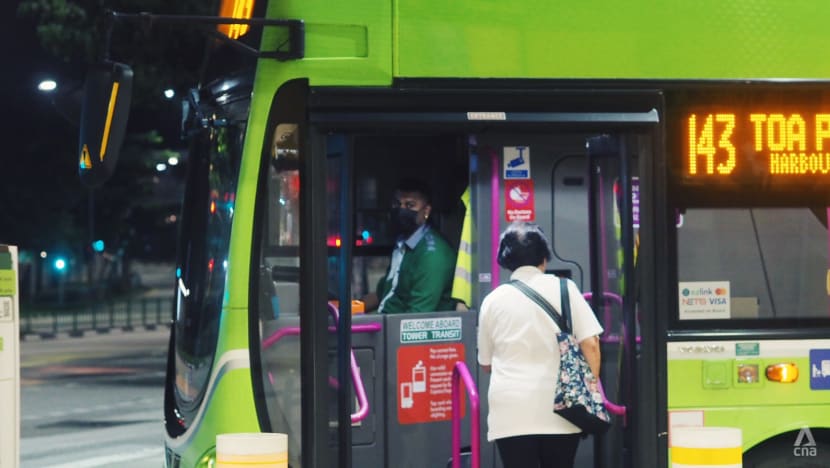
Tower Transit bus captain Shanmugam Kamasamy's journey starts at 5.25am from Jurong East bus interchange every day. (Photo: CNA/Grace Yeoh)

This audio is generated by an AI tool.
SINGAPORE: Bus captain Shanmugam Ramasamy knows his passengers’ routines by heart.
Having seen them almost daily, he's not only memorised where they board and alight, but also their preferred seat on the bus.
In turn, the 39-year-old is sometimes rewarded with food and beverage, such as from an elderly woman who boards the bus every morning with a drink for him.
Occasionally, she also gives – or "purposely" buys – him snacks, said Mr Shanmugam.
The sense of camaraderie, similar to everyday familiarity between neighbours, is possible because he has helmed the first bus of Service 143 from Jurong East to Toa Payoh bus interchange for the past two years.
On the first bus, beginning at 5.25am for him, “80 to 90 per cent of passengers are regular”, explained the Tower Transit Singapore employee.
In this little “community”, it is also possible to spot changes in passengers’ routines – which might otherwise go unnoticed.
And it was one such seemingly inconsequential detail that threw Mr Shanmugam off in September last year.
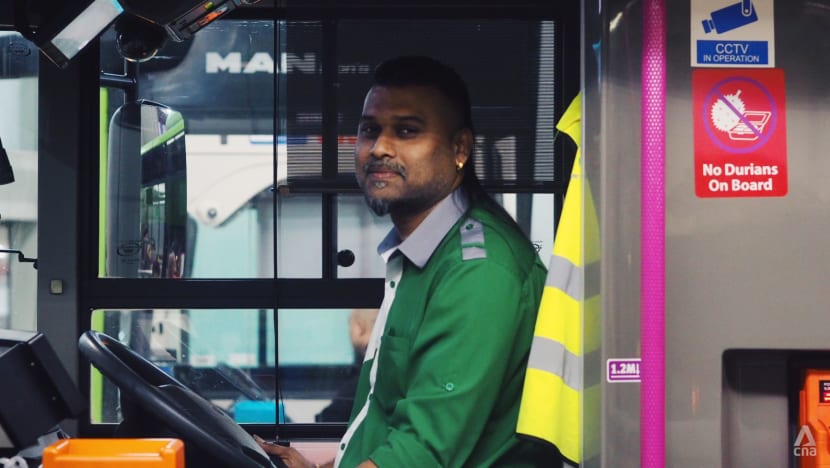
SOMETHING AMISS
Everything seemed normal when a regular passenger boarded at Teban Gardens around 5.40am, recalled Mr Shanmugam.
He had seen the passenger take the first bus three to four times a week, for over a year. “From his outfit, (I could tell) he’s not going to work. So that’s where I started to chat with him.”
The man in his mid-50s would alight opposite Block 701 along West Coast Road. It was where he went for dialysis.
When the passenger, a wheelchair user, was about to get off the bus, it was usually obvious – the special bell push-button on the handrail in the wheelchair bay has a different sound from the normal bell.
The passenger also had never been one to fall asleep on the journey, said Mr Shanmugam.
So when he failed to press the bell to alight at his usual stop, the bus captain felt something amiss.
Looking in his rear view mirror, he saw that the passenger was facing the front of the bus.
“I (felt I was) very blur. How come I never noticed this? Because usually when wheelchair users want to face in front, I don’t allow due to safety concerns," said Mr Shanmugam. "It was very weird (and) unusual.”
Nearing the passenger’s usual stop, Mr Shanmugam stopped, out of habit, despite not having heard any bell.
Upon walking to check on the passenger, the bus captain found the man unconscious.
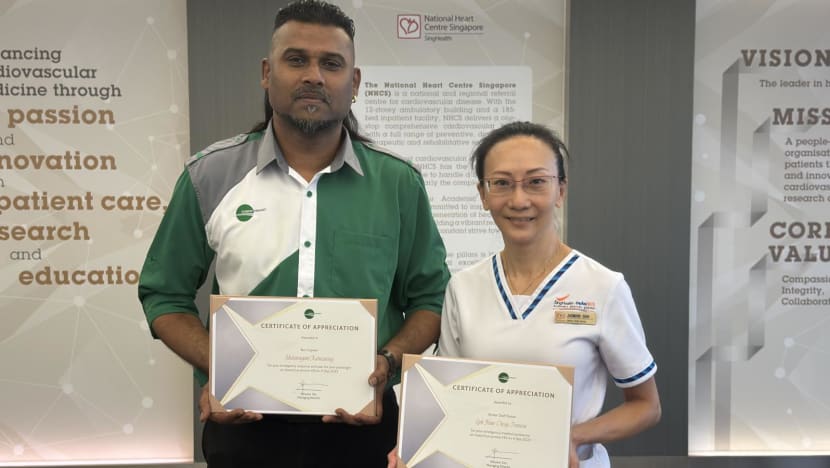
While Mr Shanmugam openly asked if anyone on the bus had a medical background, he remembered there was a regular passenger who liked to sit on the upper deck.
Specifically, he said, “near to the staircase, two seats behind”.
Ms Jasmine Goh, a senior staff nurse at the National Heart Centre, heard the bus captain’s plea and came down to help.
Together with a few other passengers, she helped the unconscious man off his wheelchair and performed CPR (cardiopulmonary resuscitation) while waiting for an ambulance to arrive.
It wasn’t the first time Ms Goh used her skills in public. The 52-year-old previously helped someone bundle up an injured leg while in a shopping mall, and also assisted in an accident at a bus stop.
But that September morning was the first time someone died.
“The first thing I knew (when I went to the passenger) is it’s not good (news). When I touched him, it was cold,” Ms Goh noted.
Like Mr Shanmugam, she saw the passenger daily, boarding one stop after him.
And while Ms Goh didn’t know him personally, she felt relieved for him. She believed he had “suffered for quite a long time” and remembered he “didn’t look good”.
She highlighted another regular passenger who worked at a supermarket and used to board service 143 at her bus stop. He hadn’t taken the bus in “a very long time” and had lost “a lot of weight” when she saw him again.
“You see someone missing; someone’s changes. (It’s easy to spot) especially when you take the first bus. It’s always the same people (so) you notice who is not around and what is happening."
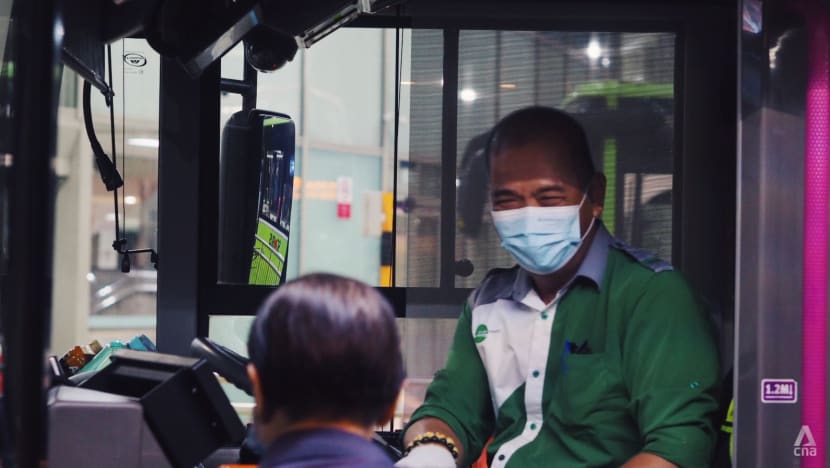
LIKE FAMILY
The usual interactions among passengers, as well as between driver and passengers, on a first bus are thankfully less sombre.
The community spirit means bus captain Tan Kok Peng, also from Tower Transit, doubles up as an alarm clock for his regular passengers. The 52-year-old also drives the first bus of Service 143, starting at 5.30am on weekdays, although his journey starts from Toa Payoh bus interchange instead.
Mr Tan, who has been plying the bus 143 route for 16 years, said his passengers are "relaxed and assured" that he will wake them up if they doze off.
“Since we’re the first bus, we know their regular schedule. Sometimes before we even reach the stop, we will alert them. Like if they don’t come down, you know they’ve fallen asleep,” he said in Mandarin.
Mr Tan’s regulars tend to reward him with goodies, particularly during Chinese New Year. He admits not knowing how to reject such goodwill, and has even had passengers ask to visit his home in Johor Bahru, Malaysia during the festive season.
“A Malay auntie once asked me for my number ... She used to sell curry puffs and would give me two whenever she took my bus daily,” he recalled. “She would give me hongbao (red packet) whether it’s on Chinese New Year or Hari Raya. This type of relationship … has lasted more than 10 years.”
For Chinese New Year last year, Mr Tan received around S$900 in total from passengers.
“They ask me to keep the money, so if I don’t keep it, it’s like I don’t respect them," he said. "Sometimes I don’t want to take it, but they will put it into my shirt pocket. And when I tell them that they’re also old and they need the money, they will say ‘No, this is for you’.
“Sometimes in one hongbao, there’s S$100. That’s a lot (of money) for the elderly.”
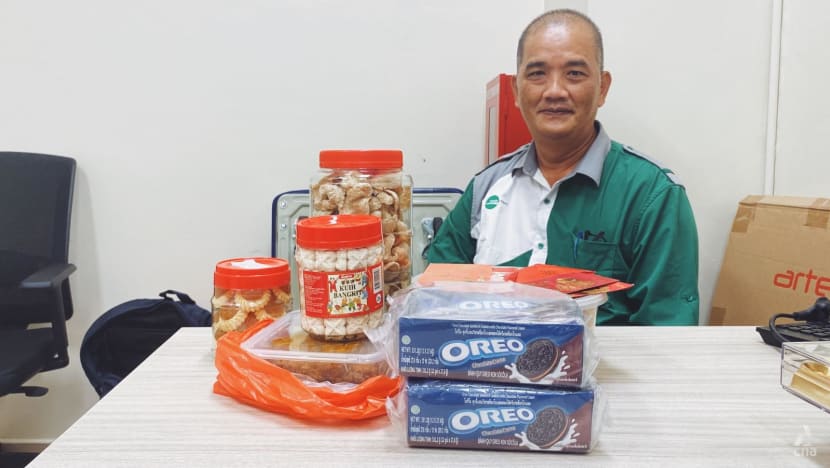
But perhaps the biggest reward for Mr Tan is seeing some of his “naughty” passengers grow up.
A group of primary school boys, who used to line his bus seats with toothpicks, were once caught and chided by him, he shared.
After years of not seeing them, one recently boarded his bus. The passenger now works in a bakery, and said he would bake bread for Mr Tan, the bus captain shared.
“When I talk to my family members about (my passengers), sometimes I will tear up.”
So did Mr Shanmugam, when relating his account of the regular passenger who died. The incident hit especially hard when the bus captain learnt that the man shared the same birth date and month as him.
“I’m the last person who spoke to him, and after that, he didn’t speak to anyone," said Mr Shanmugam. "Twenty minutes later, he was gone."

















